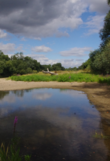Collections
Favourable reference value (FRV) is a concept that is derived from EU Habitat Directive’s definition of favourable conservation status that relates to the ‘long-term distribution and abundance’ of the species’ population (Article 1i), and for habitats to the ‘long-term natural distribution, structur ...
Recently, the assessment of changes in marine ecosystems and their drivers is an issue of crucial importance on the lookout for sustainable natural systems and service delivery allowing for long-term ecosystem preservation. In marine systems, change may occur directly from human activities, indirect ...
Worldwide, the loss of biodiversity in wetlands, like rivers and their floodplains and peatland, but also in deltas and estuaries is dramatic. Reasons are intensive land-use such as farming and urbanisation, drainage, construction of levees or bank stabilisation, or straightening of river courses an ...
Landscapes are composed of heterogeneous patches containing different habitat and land cover types that should be identified in order to assess structural and functional ecosystem properties. Most ecosystem services assessments use proxy variables derived from land cover or habitats classes as input ...



